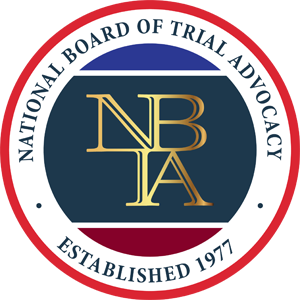
The National Board of Legal Specialty Certification (NBLSC) was originally founded in 1977, as the first American Bar Association ("ABA") certification board. The organization was formerly known as the National Board of Trial Advocacy (NBTA). The name was changed to the National Board of Legal Specialty Certification (NBLSC) in 2006. At that time, the National Board of Trial Advocacy (NBTA) became a division of NBLSC.
In 2015, the organization changed its name back to the National Board of Trial Advocacy (NBTA). Find more information here: National Board of Trial Advocacy (NBTA).
From 2006 until 2015, the NBLSC was one of the largest national attorney specialty certification programs. Overall, it was the fourth-largest certification program. The NBLSC was accredited by the ABA to certify attorneys in five specialty areas of law that pertain to trial advocacy including criminal trial advocacy, civil trial advocacy, family trial advocacy, social security disability trial advocacy, and civil pretrial practice. More than 2,400 attorneys were certified by the NBLSC.
Eleven states formally-approved NBLSC certification, including Alabama, California, Connecticut, Georgia, Idaho, Indiana, Minnesota, Ohio, Pennsylvania, South Carolina, and Texas. Several other states have rules that formally recognize agencies accredited by the ABA, including Delaware, Florida, Hawaii, Maine, Mississippi, New Jersey, North Carolina, South Dakota, Tennessee, Vermont, and Wisconsin.
Additional Resources:
National Board of Legal Specialty Certification on Wiki - Read more about the history of the NBLSC on Wikipedia including how the National Board of Social Security Disability Advocacy and the National Board of Trial Advocacy adopted this name from 2006 until 2015. Find information on the history of this national board certification program, its certification, and its acceptance within the legal community.
This article was last updated on Friday, November 22, 2019.
